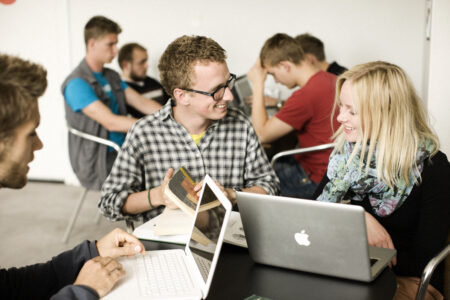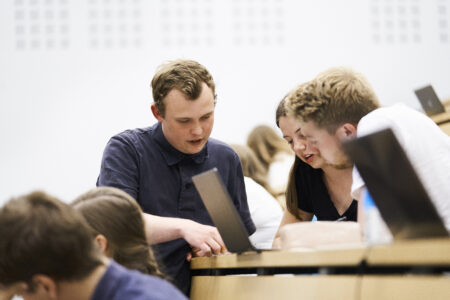From the climate crisis to the relentless advance of AI, the world is in desperate need of answers and solutions, many of which can be tackled with economics. At the University of Copenhagen, the Master of Science in Economics is a launchpad for those who seek the skills to solve society’s challenges.
Specialised programmes for specialised impact
You can tailor the MSc to match the problems you want to solve — whether that’s climate change, algorithmic decision-making, or global inequality. Those drawn to environmental economics can explore modules like “Economics of the Environment and Climate Change,” “Advanced Economics of the Environment and Climate Change,” and “Energy Economics of the Green Transition.”
More interested in the societal implications of AI? Courses such as “AI for Humanity: Machine Decisions,” “Learning and Societal Consequences,” “Advanced Empirical Finance: Topics and Data Science,” and “Programming for Economists” offer crucial insight into the intersection of technology and policy.
Meanwhile, those focused on development and equity can choose from “Development Economics,” “Advanced Development Economics: Micro Aspects,” and “Advanced Development Economics: Macro Aspects.” If you’ve set your sight on a future in international trade, courses such as “International Economics,” “Advanced International Trade,” and “Economics of Exchange Rates” will prepare you well.
These courses are taught by professors who are at the frontlines, conducting cutting-edge research in their respective fields. Two such professors are Frikk Nesje and Andreas Bjerre-Nielsen.

In June 2021, economists from President Biden’s administration asked to hear more about Frikk Nesje and his international colleagues’ work in the climate field. Source: University of Copenhagen website
From Copenhagen to the White House
An associate professor in the Department of Economics at the University of Copenhagen, Nesje’s work focuses on resource and environmental economics.
His research has influenced public guidance in countries such as Germany, Ireland, the Netherlands, and the US, and his work is referenced in public documents by the European Union, the United Nations Development Programme (UNDP), the World Bank, and the White House, just to name a few.
At Copenhagen, Nesje teaches “Environmental and Resource Economics.” The course introduces the economic concepts and methods relevant for analysing problems and policies relating to the environment and climate change.
When you think about climate solutions, economics, as a social science, might not be the first study that comes to mind as the most relevant subject. But Nesje knows that his discipline uniquely contributes to the field.
“A report by the Environmental Protection Agency found that uncertainties about social science components are as important as uncertainties about natural science components when trying to pin down the externality cost of CO2 emissions,” he says. “This finding is also echoed in one of my papers.”
Being an active researcher, the terms and studies that Nesje teaches are often used by practitioners, helping students stay connected and updated with the industry as it develops.
Studying the economic implications of AI
For Andreas Bjerre-Nielsen, economics was something of a happy accident. “I started studying economics as it was the only integrated bachelor’s and master’s degree with a winter start in Copenhagen,” Bjerre-Nielsen says.
He planned on changing his major to engineering or physics but ended up liking the subject.
Today, Bjerre-Nielsen’s work explores the impact of AI on society, which is what his class, “AI for Humanity: Machine Decisions, Learning and Societal Consequences,” explores. Beyond teaching students the basics of how AI works from a technical perspective, the course evaluates whether AI tools are actually helpful and how they may work (or not) for different groups of people.
Over at the Copenhagen Centre for Social Data Science (SODAS), an interdisciplinary social science centre located at the Faculty of Social Sciences, Bjerre-Nielsen gets to access researchers with expertise in emerging methods and technology, like large language models. “It also allows me to engage in research topics outside classic economics where these emerging methods and research questions receive higher attention,” he says.

The Department of Economics hosts a Centre for Economic Behaviour and Inequality, a Development Economics Research Group, and an Environmental Economics Group. Source: University of Copenhagen
Doing good, doing well
By providing skills that address societal challenges, economics not only helps you do good, but it helps you do well. Job prospects are bright, according to the university. There is virtually no unemployment among their candidates in the Danish labour market and the salaries of their graduates rank among the highest in Denmark.
This may in part be due to the comprehensiveness of their MSc in Economics, as it covers everything from climate change to AI. One might wonder, though, why is it important for students to be exposed to this breadth of societal challenges?
Without this exposure, economists may still become proficient in core methods of micro, macro, and econometrics.
“However,” Bjerre-Nielson says, “to understand societal challenges, there are many particular insights and details in each domain that are necessary to grasp but which cannot be squeezed into a lecture or two. That is why these courses enable students to develop expertise in these new fields.”













